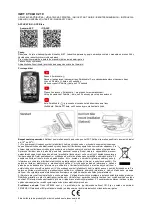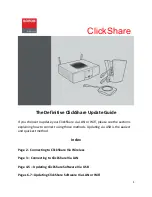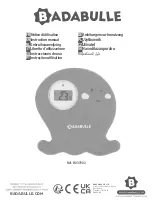
GASGUARD IS CONTROLLER Issue: R2, Date: 26/09/2011, CRN: 7502
Page 34
5.3.2
Type of Cable
Cables that are used to connect the Controller to other parts of a system or other equipment must be adequately
rated in terms of maximum voltages and current that it can handle safely.
Cable electrical resistance, capacitance and inductance must also be taken into account in order to maintain
compliance with equipment / system entity parameters (see previous section). Cables will have resistance,
capacitance and inductance parameters specified per unit length. It is therefore important to take into account
the cable length used in an installation in respect to the total value of these parameters.
In addition to their electrical properties, cables must afford physical protection against being damaged by impact
or abrasion. This applies particularly to cables that are external to a wall cabinet that houses the Controller.
Cables may be both electrically screened against noise interference as well as sheathed in a strong wire jacket to
prevent crushing. Such cables would generally also be sheathed in a material that is resistant to abrasion and
attack from chemicals such as fuels.
5.3.3
Cable Termination
When connecting cables to the Controller, it is not sufficient to simply strip and twist a cable’s inner conductor and
insert into the Controller terminal. Stripped and twisted conductors must not be used and especially ones tinned
with solder. Solder exhibits a behaviour known as ‘cold-creep’ and in effect would flatten under the pressure of
the Controller’s terminal screw. Once this happens, the connection is likely to become loose and unreliable. All
connections to the Controller must be made via appropriate cable crimp connectors. The Controller’s terminals
can take a cable crimp of up to 2.5mm diameter.
5.3.4
Cable Marking
When making connections to the Controller, individual conductors should be marked with a cable marker or tag
so that correct connections can be made across an entire system. Unmarked conductors are generally hard to
have their function identified across the physical parts of a system. This could lead to potentially dangerous
system operation due to mis-matched connections between equipment, as well as obvious system malfunction.
5.3.5
Cable Restraint
All connected cables that run from the Controller to other equipment must be suitable restrained to prevent stress
on the controller terminals. If cables are allowed to freely hang and pull against a terminals fixing screw, then
eventually the connection could fail. Such unrestrained connections could create the potential of system
malfunction, resulting in the creation of a hazardous risk situation. Proper cable restraint will ensure that the
potential risk of system failures due to cable breakages is minimised.
Summary of Contents for gasguard
Page 47: ...GASGUARD IS CONTROLLER Issue R2 Date 26 09 2011 CRN 7502 Page 46 ...
Page 62: ...GASGUARD IS CONTROLLER Issue R2 Date 26 09 2011 CRN 7502 Page 61 B2 Main Menu Flowchart ...
Page 63: ...GASGUARD IS CONTROLLER Issue R2 Date 26 09 2011 CRN 7502 Page 62 B3 Calibration Flowchart ...
Page 64: ...GASGUARD IS CONTROLLER Issue R2 Date 26 09 2011 CRN 7502 Page 63 B4 Configuration Flowchart ...
Page 74: ...GASGUARD IS CONTROLLER Issue R2 Date 26 09 2011 CRN 7502 Page 73 Appendix C Approvals ...
Page 75: ...GASGUARD IS CONTROLLER Issue R2 Date 26 09 2011 CRN 7502 Page 74 ...
Page 76: ...GASGUARD IS CONTROLLER Issue R2 Date 26 09 2011 CRN 7502 Page 75 ...
Page 77: ...GASGUARD IS CONTROLLER Issue R2 Date 26 09 2011 CRN 7502 Page 76 ...
Page 78: ...GASGUARD IS CONTROLLER Issue R2 Date 26 09 2011 CRN 7502 Page 77 ...
Page 79: ...GASGUARD IS CONTROLLER Issue R2 Date 26 09 2011 CRN 7502 Page 78 ...
















































